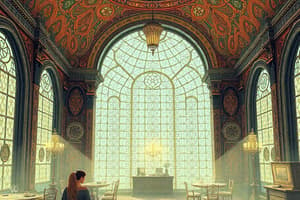Podcast
Questions and Answers
According to the pluralist theory of government, ________.
According to the pluralist theory of government, ________.
Government policy is formed as a result of the competition between groups with different goals and interests.
The United States government is an example of a direct democracy.
The United States government is an example of a direct democracy.
False (B)
Supporting the actions of the Democratic Party simply because one identifies oneself as a member of that party is an example of ________.
Supporting the actions of the Democratic Party simply because one identifies oneself as a member of that party is an example of ________.
- Latent preference
- Partisanship (correct)
- Ideology
- Social capital
Which of the following is a good example of a tradeoff?
Which of the following is a good example of a tradeoff?
When a person is asked a question about a political issue that he or she has little interest in and has not thought much about, that person's answer will likely reflect ________.
When a person is asked a question about a political issue that he or she has little interest in and has not thought much about, that person's answer will likely reflect ________.
The elite theory of government maintains that ________.
The elite theory of government maintains that ________.
What goods are available to all without direct payment?
What goods are available to all without direct payment?
In which form of government does a small group of elite people hold political power?
In which form of government does a small group of elite people hold political power?
Flashcards are hidden until you start studying
Study Notes
Government Theories and Concepts
- Pluralist theory posits that government policy results from competition among diverse groups with varying interests.
- The United States government operates as a representative democracy, not a direct democracy.
- Partisanship is when individuals support their political party's actions solely based on their party affiliation.
Political Trade-offs and Preferences
- A trade-off example includes government actions that satisfy both environmental activists and ranchers through land management decisions.
- Latent preferences refer to answers individuals give on political issues they haven't deeply considered or about which they feel little interest.
Elite Theory and Political Power
- Elite theory asserts that a small, wealthy, politically influential group governs, often ignoring the needs of the general populace.
- Special interest groups play a role in shaping government policy but do not operate independently of economic and political elites.
Goods Classification
- Public goods are resources available to everyone without direct payment, contrasting with private goods that require individual purchase.
Forms of Government
- Oligarchy is characterized by a small group of elite individuals holding substantial political power, differing from other government types like democracy or monarchy.
Studying That Suits You
Use AI to generate personalized quizzes and flashcards to suit your learning preferences.




